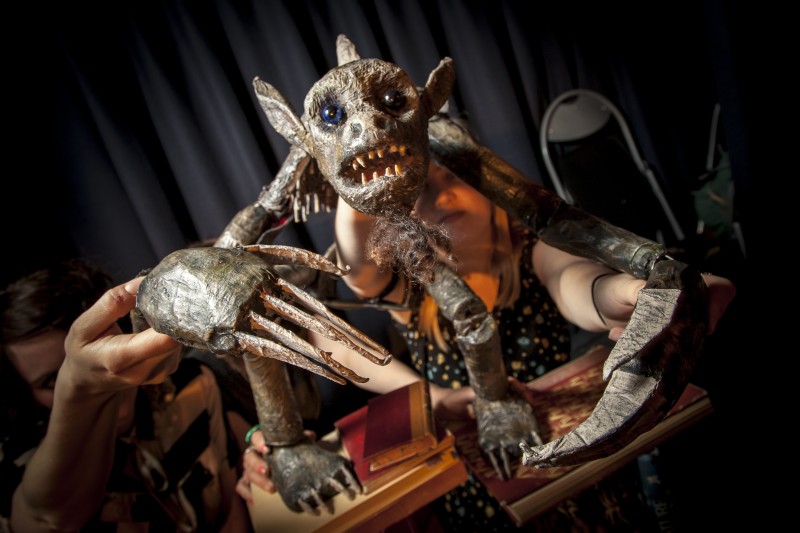 Beowulf is the first full length production by Barely Human Puppets, who have made a name for themselves in Brighton for their quirky short shows and beautifully crafted puppets by artistic director Daisy Jordan. It’s an ambitious text to tackle, embedded in Anglo-Saxon artistic convention, not to mention written in an Old English language that is now an alien tongue. Yet there are opportunities too: this dense storytelling language is designed to be spoken, with much to offer the fearless performer; and the poem’s otherworldly theme – of powerfully strange invading monsters – lends itself in a very immediate way to the powerful strangeness of puppetry.
Beowulf is the first full length production by Barely Human Puppets, who have made a name for themselves in Brighton for their quirky short shows and beautifully crafted puppets by artistic director Daisy Jordan. It’s an ambitious text to tackle, embedded in Anglo-Saxon artistic convention, not to mention written in an Old English language that is now an alien tongue. Yet there are opportunities too: this dense storytelling language is designed to be spoken, with much to offer the fearless performer; and the poem’s otherworldly theme – of powerfully strange invading monsters – lends itself in a very immediate way to the powerful strangeness of puppetry.
The company have approached these challenges with some bold choices. Writer Craig Jordan-Baker works through a clear interpretation in his adaptation, framing Grendel and his mother as the enemies of a fledgling society represented by books and stories, whilst at the same time casting the hero, Beowulf, as a callow youth whose enthusiastic naiveté for ‘his own legend’ critiques the warrior template and perhaps more generally, the egocentricism of this emerging human culture. Our ambivalence toward Beowulf is magnified by the company’s portrayal of Grendel’s incursions as cultural and psychological – his sack of the hall is represented by a tearing up of books, and in this version he criticises more often than slays. Here Grendel is a symbol of the simple completeness of the animal, ‘born already his complete self’, in contrast to Beowulf’s internal conflicts. There’s a sense in the text’s dramaturgy, though latent at the moment in this production, that this idea could go further and connect to the relationship between puppets and people on stage too.
I’m not enough of a scholar of Old English to comment on the validity of this reading of the text – it certainly places its ideas in a more contemporary framework of our troubled relationship with the messy, unruly natural world. Where the production does run into problems though is in some of its theatrical choices. There’s a real variability in performance styles and quality amongst the cast of four female puppeteers whose presence is all-too accented by the Dukebox’s small stage. It isn’t clear why the company have chosen to work with visible puppeteers, who determinedly ‘invisible’ themselves throughout – there is no eye contact or interchange with the Poet-narrator character or with one another, placing their performances in an uncanny no-man’s-land, both highly present and unacknowledged. There is more to be explored about the puppeteers’ relationship to the story, the audience, the Poet, and one another. The puppetry also needs much more work to sharpen the details of the visual storytelling, and take it beyond rhythmic gesticulating to the Poet’s words (it seems a missed opportunity not have the puppeteers speak their own characters’ lines) and deeper into presentation of Jordan-Baker’s intriguing characters through their own rhythm and breath.
That’s not to say there aren’t moments of theatrical deftness. The company throw everything they’ve got into transforming this pub back room into a den of wonder. Jordan’s puppets, particularly the monsters, are visually surprising, muscular tabletops well constructed to convey immediate power and weird mobility. Musician Paul Mosley, in the corner, bristles with instruments from horn to glockenspiel wielded like his own private armoury to animate the diverse atmospheres and characters of the story. His detailed underscoring through this varied instrumentation adds real richness and works in effective counterpoint with Tom Dussek’s mellifluous Poet narrator. The visual storytelling can be inventive, especially some lovely work with shadow play and props. Many of the core ingredients are there – but the company need to work through their theatrical language and choices to move this interesting production to the next level, beyond a storytelling presentation with puppeteers into the theatrical adventure it can be.
